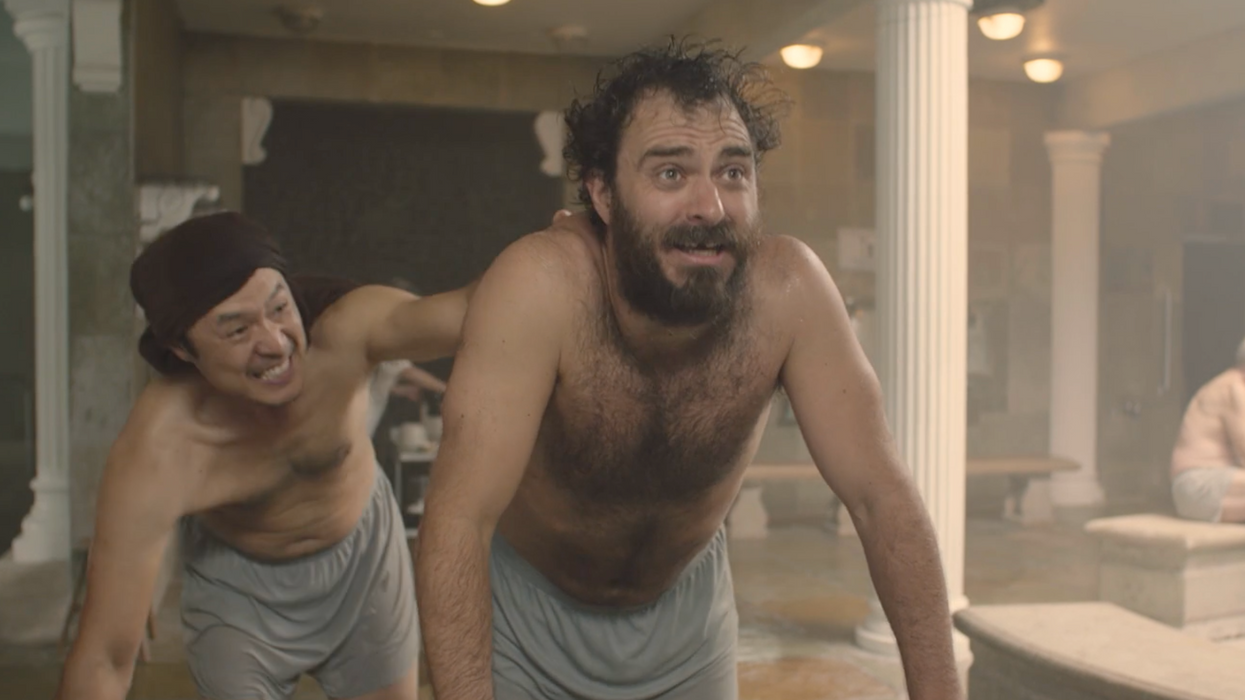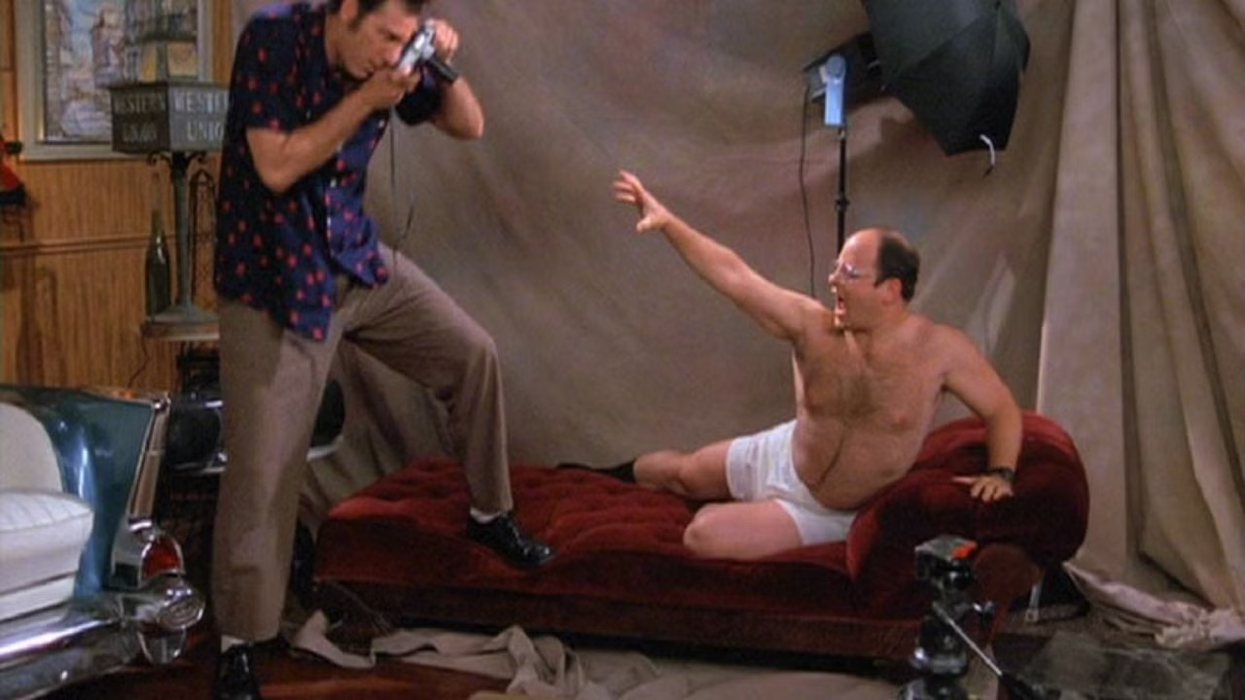Super Deluxe's 'The Passage': Phillip Burgers on Why Dialogue Doesn't Always Matter
In film, actions speak louder than words.

There's a new kid in Park City this year and its name is Indie Episodics. With such a boon in the television format, it's pretty easy to see why. As Sundance has always been a mecca for short filmmakers, we're sure a format that straddles the line somewhere between short and feature will grow to be one of the more popular destinations for entries over the next couple of years.
With that increase in popularity, the program's future may also veer towards more mainstream fare. For now though, we're subject to some of the most interesting, experimental pilots ever seen on festival grounds. One such pilot comes from the twisted mind of Phillip Burgers, a creator who prizes not only physical comedy but the form of language which a single physical gesture can create. He calls it The Passage.
The Passage follows Burgers, wide-eyed and mute, who’s on the run after escaping captivity. His childlike ineptitude keeps getting him into trouble, however, and the shadowy agents who’ve been hired to recapture him are always one step behind. The result is a series of globe-trotting misadventures and surprising new friendships.
"It wasn't like, 'Oh, this ... Well, I'll try to sell it as a TV show.' It was more like, 'Oh, this is a way to make it.'"
Burgers first caught the eye of the off-beat geniuses that comprise Abso Lutely Productions after winning the 2012 Edinburgh Comedy Award for Best Show and has since had television projects with Netflix, FX and the UK’s Channel 4. These are the folks that brought such shows as Tim & Eric Show Great Job! and Nathan for You to life, and they clearly have a knack for the absurd. It shouldn't be surprising that the episode is directed by the director and executive producer of The Eric Andre Show, Kitao Sakurai.
I hopped on the phone with Burgers a couple of days before Sundance to talk about how a pilot can be crafted to ensure it gets picked up, throwing aside dialogue in favor of physicality, and how to best take advantage of a visual medium.
No Film School: What does the term indie episodic mean to you?
Phil Burgers: I don't really know. I don't know. I didn't know...I thought it was like just anything that was made for TV or something.
NFS: So did you make this for TV?
Burgers: Yeah, well we made with the intention of continuing to make it. It was a kind of almost a pilot. I also think it doesn't fit into lots of the television format or what TV people are looking for. It's kind of outside of that mainstream. Maybe that's what it means, indie episodic, too. It's like, "How is this a TV show?"
NFS: There are so many outlets for a TV show these days.
Burgers: We want it to land somewhere that lends itself more to a slower build, if you will. Like HBO or Netflix or Hulu or something. We wanted it to be a really slow burn and cinematic in that way.
NFS: Right. So, something more with a story arc over the course of a season rather than just short clips you'd see in a web series or on Adult Swim.
Burgers: Yes, yes, yes. Exactly.
NFS: Is that how the idea first came about?
Burgers: No. Just like all these unrelated ideas. It was a thrill to film, because the challenge became, how can I piece them together to potentially be its own TV show? It wasn't like, "Oh, this ... Well, I'll try to sell it as a TV show." It was more like, "Oh, this is a way to make it."

Burgers: I mean, that was just like a creative challenge to set myself. It was like, "Oh, what if I could do this without talking?" You know? It was, "Okay, great. Let's do it without talking. But does that mean the whole thing is going to be silent?" It was like, "Nah. Is that really sustainable and is that really a choice we want to make?" Then, at this point, I was sitting down with Kitao Sakuri, who was the director and who helped me shape the piece. We thought, "Oh no, that would be kind of lame if it's all no talking. What if people spoke?" But, because we're already in these different cultures, everyone just spoke these different languages, and that's why I never spoke." It's like this contrived choice of me being a silent clown vs. "Oh, I actually maybe can speak. I just can't because I don't understand the languages I'm around."
NFS: It seems like you have a strong background in mime and clowning. Your gestures throughout the short really act like a universal form of language.
Burgers: A clown conveys information or meaning through gestures. Its humanity does anyway. People are always not talking and doing things, and what you see conveys something of what they do. You're making a film. Why not just go visually? If you wanted to talk so much, then maybe do a podcast. Or write a book. It's also fun to do dialog, of course. It was just like really using the film medium. And it wasn't necessarily like, "Oh, clown. How can we throw these clown gestures in?" It's like "What does this guy do when he can't talk?" What does someone do in another culture when they can't talk? They don't become a mime or something, they just are a human being who can't really say anything. What are you going to use? Then you're just kind of stripped away, and what comes then?
"Some people like to setup with a whole idea and then start finding the little bits that fit into that idea, and then some other people, I guess, start with a smaller idea and see how that shapes the bigger idea."
NFS: On this journey, did every culture take on a different emotion, in a sense? For instance, the Korean spa seemed be a violent thing, while the Haitian world was joyous, and then back to violence with the Norweigians.
Burgers: I think maybe there is a motif of darkness to it or of things always breaking. it's finding some element of peace and joy, and then having it be interrupted or taken away from you.
I'm in the Mexican church, and it's all great because I'm playing drums in band, and it's all good, and I'm in a community. You know? That's also a huge thing, is like finding community. Then always having to be torn away from it. I end up in this oasis kind of place in the Korean Spa. There's a little heavenly sort of area, but then I end up getting whipped. Then I end up getting nursed and I'm being taken care of, and it's all good, and the FBI guys come. Then, you know, I'm falling in love with this woman, and it's all great, and we're going this it's all beautiful, and we're on this romantic journey in the boat, and then it's all taken away from me. Then I get saved by the Norwegians, and I get fed soup and he's taking care of me. It's going to be okay. Then, they all commit suicide.
NFS: Since this is a pilot, what sort of strategies did you employ to try and ensure that you get picked up for a full season?
Burgers: We did not. The only strategy we ensured was showing this strange build from world to world, and to show the scope of it. Aside from that, not thinking at all. In the end, it also works as a really nice simulated kind of complete thing, even though it doesn't have any resolution at the end. We weren't thinking too much about the season arc when we made it at all. It was just like, "Oh, what could be fun? What would be fun?" Then, when we made it, we thought, "Okay, here are our elements." How can they all feed into this whole story kind of thing? I think that's ultimately a way to work. You start from the ground up versus looking down at it all, if you will. Some people like to set up with a whole idea and then start finding the little bits that fit into that idea, and then some other people, I guess, start with a smaller idea and see how that shapes the bigger idea.

Burgers: No, no. I mean, I did do like a theater/clown school, so I have that kind of educational background. But it was very unacademic. It was very just get up and do. Just practical.
NFS: It lends itself really visually. Like all the clown and mime work to film, in general.
Burgers: I'm just doing things. It's like, yeah. When your body just moves to pick something up, it's not like being a clown or being a mime. It's just doing it.
NFS: I think that's good advice for anyone who's actually just trying to get into film, is to just do something. Don't just sit around. Get out and try something.
For more, see our ongoing list of coverage of the 2018 Sundance Film Festival.












